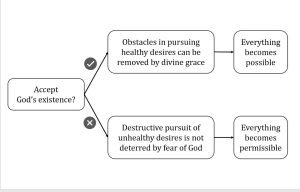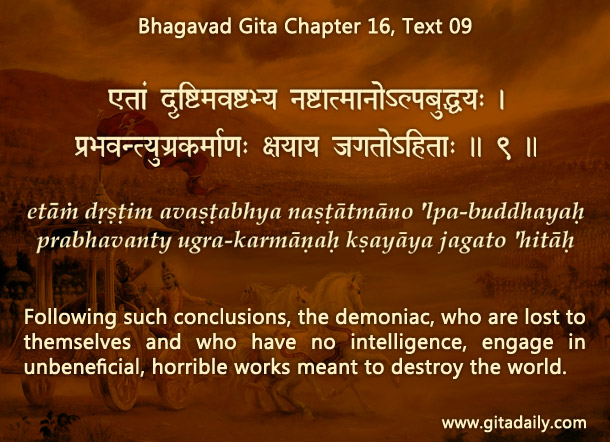
We all pursue the things that we desire and we avoid the things that we fear. Let’s consider how desire and fear are affected by atheism.
The longing for life’s good things often inspires us to use more effectively our various God-given gifts including intelligence, talents and the capacity for industriousness. When our path to fulfilling our healthy desires is blocked by our human limitations, we often turn toward God (07.16). By his grace, all obstacles can be removed (18.58), thereby making the impossible possible.
Unfortunately, when someone makes atheism their defining worldview, they cut off their access to hope of higher assistance and guidance in dealing with life’s inevitable obstacles. Thus, their circumstantial distress on failing to get something desirable can degenerate into an existential despair: the paralyzing fear that they may never become good enough to get anything desirable in life.
Not only that, their desires can be distorted by selfish drives such as lust, anger and greed, which can impel them to act self-destructively and destructively. To curb these impulses, human society has erected systems of culture and law. Though important and even indispensable, these systems can’t police everyone. That’s why such human oversight has been historically complemented by divine oversight: the understanding that all our actions are witnessed and judged by an omnipresent, omniscient being. This understanding can be a powerful deterrent to immorality when pursuing our desires. Tragically, such deterrence is damaged, even destroyed, by atheism.
Does that mean all atheists become licentious and immoral in pursuing their desires? No, many of them have self-restraint, but their self-restraint is not due to their atheism; after all, there is hardly anything in the atheistic worldview to inspire moral discipline. Their self-restraint is in spite of their atheism — it is due to other influences such as their upbringing or previous life karma. Without those protective influences, the path from atheism to hedonism is a slippery slope down which most people can’t avoid sliding (16.09).
One-sentence summary:
With God, everything is possible; without God, everything is permissible.
Think it over:
- How is everything possible with God?
- How is everything permissible without God?
- If everything is permissible without God, why are all atheists not licentious?
***
16.09: Following such conclusions, the demoniac, who are lost to themselves and who have no intelligence, engage in unbeneficial, horrible works meant to destroy the world.
To know more about this verse, please click on the image


God guides the PATH OF LIFE